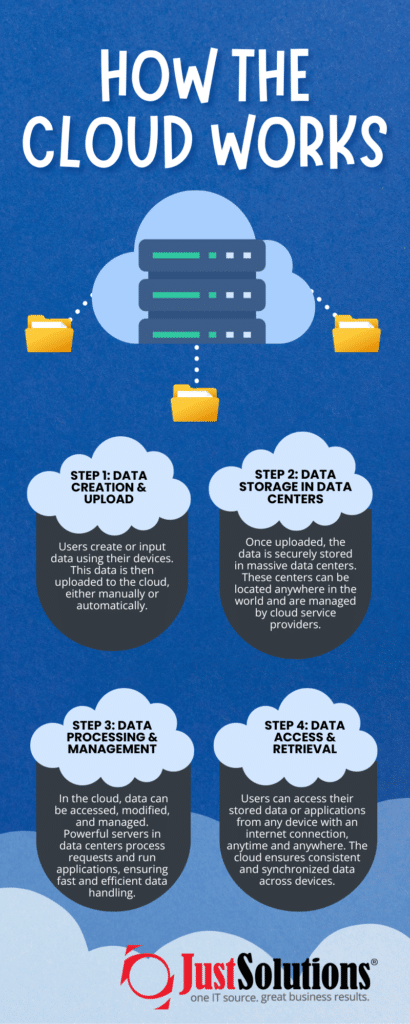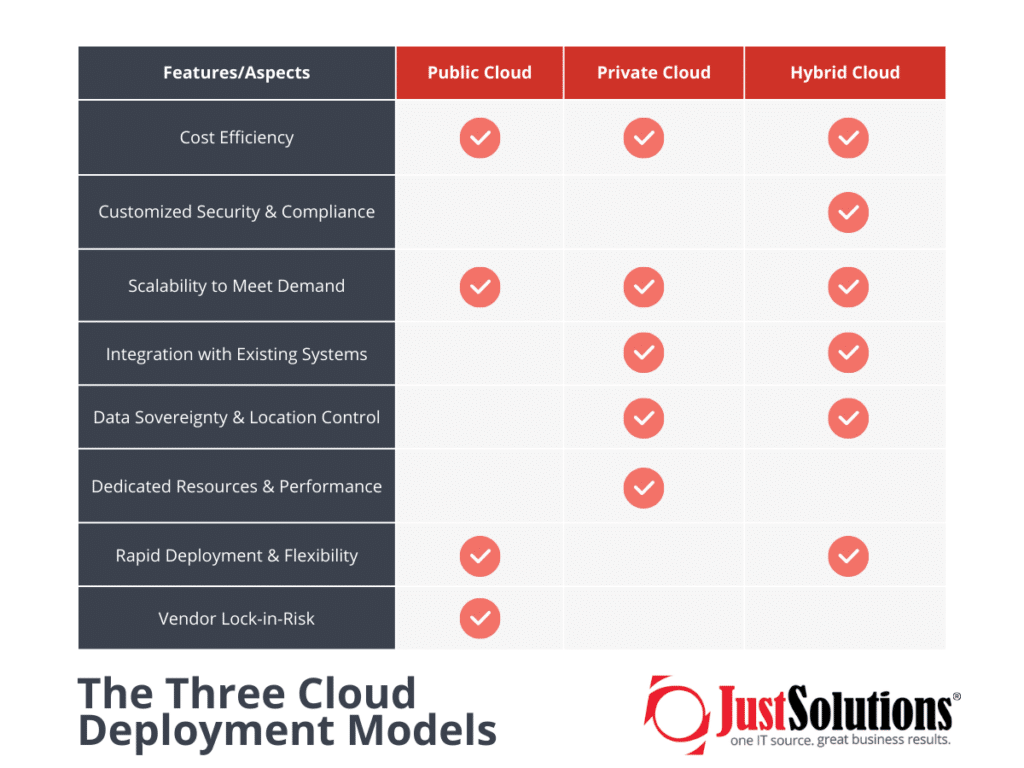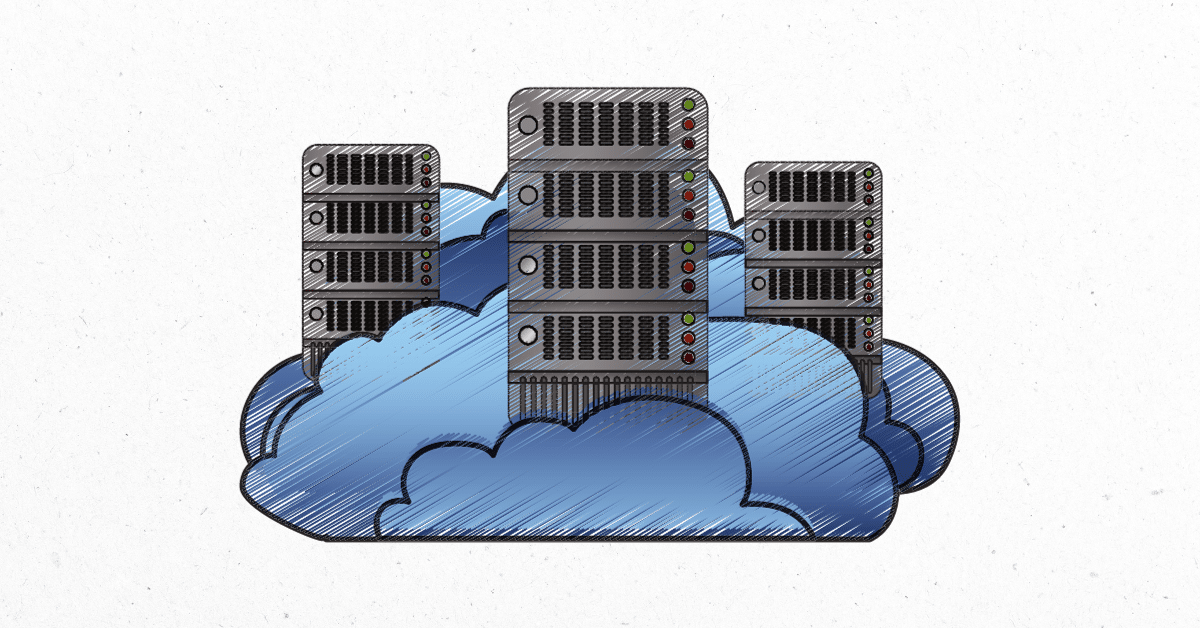You’ve probably heard the term “the cloud” by now. It’s thrown around in conversations about technology, storage, and the internet. But what exactly is the cloud, and how does it impact your business? In this blog, we’ll break down the jargon surrounding the cloud and shed light on its significance for businesses today.
What is the Cloud?
At its core, “the cloud” refers to a network of remote servers hosted on the internet. These servers store, manage, and process data and applications, making them accessible to users via the internet. Instead of depending solely on your local device, the cloud lets you tap into the vast resources of these servers scattered in data centers around the world.
Think of it as a vast digital library: a place where you can store and access your digital assets, such as photos, videos, documents, and software, without needing a physical device to hold everything.

The Different Types of Cloud Services
Not all cloud services are created equal. There are three main types of cloud computing services that businesses should be aware of:
- Infrastructure as a Service (IaaS): This gives businesses access to vital IT infrastructures such as servers, virtual machines, and storage without the upfront costs. Examples include Amazon Web Services (AWS), Microsoft Azure, and Google Compute Engine (GCE).
- Platform as a Service (PaaS): Designed for developers, PaaS provides an environment to develop, test, and deploy software applications. Heroku and Google App Engine are popular choices.
- Software as a Service (SaaS): These are ready-to-use applications accessed over the internet. Dropbox and Salesforce are prime examples.
The Nuts and Bolts
Cloud infrastructure comprises all the hardware and software enabling the cloud’s operations. This includes the servers, data centers, and networks that ensure smooth operations. Cloud service providers like AWS, Microsoft Azure, and Google Cloud are responsible for maintaining this infrastructure. They continuously upgrade and manage data centers filled with powerful servers and cutting-edge networking equipment.
How Does the Cloud Work?
Your devices connect to the cloud using the internet, allowing access to files and applications from virtually anywhere. This process relies on data transfer protocols, security encryption, and authentication mechanisms. While these might sound intimidating, one of the cloud’s advantages is its user-friendly interfaces and applications that hide much of this complexity.
The Three Deployment Models
The cloud is versatile, and there isn’t a one-size-fits-all solution. Businesses can choose among three primary cloud deployment models based on their needs:

- Public: Managed by third-party providers like AWS, Google Cloud, or Microsoft Azure.
- Private: Uses physical infrastructure to create virtual servers storing a company’s data within a private data center.
- Hybrid: Combines the advantages of both public and private, storing data both on-site and in the public cloud for backup.
Empowering SMBs with Cloud Solutions
Small to medium-sized businesses (SMBs) stand to gain immensely from cloud adoption. It offers cost-saving potential, scalability, and tools previously reserved for bigger enterprises. The flexible pricing models of many cloud services ensure affordability, even for businesses on a tight budget.
Additionally, the cloud’s disaster recovery capabilities ensure that in events like system failures, data remains secure and easily retrievable.
Is My Data Safe in the Cloud?
Security is paramount. Leading providers invest extensively in advanced security measures, often surpassing what individual companies can allocate for security. While providers maintain robust security infrastructure, it’s vital for businesses to also adhere to best practices and ensure their data remains safe.
Industry Applications
From healthcare to finance, the cloud is revolutionizing industries. It’s enabling global collaborations, securing sensitive data, and facilitating rapid innovation. As the business world shifts towards remote and hybrid work models, these solutions ensure uninterrupted operations, fostering productivity and collaboration even in the face of unexpected disruptions.
Getting Started
Investing in cloud solutions is a strategic move that can transform your business operations, enhance security, reduce costs, and position your company for future growth. If you are considering adopting cloud computing, do your research. There are many different cloud providers, so it’s important to choose one that is right for your needs. You’ll want to consider factors such as the cost, the level of support offered, and the security features available.
It’s okay to start small. You don’t have to move everything over at once. Start with a few key applications or services. You can gradually move more things as you become more comfortable with it. And of course, if you are not comfortable managing your own migration, you can partner with an expert to help you.
Key Takeaways:
- Start Small
- Choose The Right Provider
- Do Your Research
- Get Help from a Professional
Ready To Migrate To The Cloud?
The cloud is more than just a technological buzzword. It’s a transformative tool that businesses, regardless of their size or industry, can leverage for growth, efficiency, and innovation. With its myriad of services and deployment models, there’s a cloud solution for every business need.
Our managed IT services team has the expertise and experience to help you seamlessly migrate to the cloud, ensuring a smooth transition and maximum benefits.
Interested in learning more? Contact us and speak with a member of our team.

